Ellie Jordan, Ghost Trapper Read online
Page 10
Mercy’s clothes were moth-eaten, the remnants of a dress, maybe some pants, some leather-strap sandals coated in mold.
I did find one thing that wasn’t rotten to dust, though, and I couldn’t help taking a sharp breath when I saw it.
“What’s wrong?” Stacey asked.
I held up a tarnished necklace with a silver pendant shaped like a raindrop.
“I’ve seen this before,” I told her. “An image of it, I mean. I think Mercy’s ghost was wearing—”
A loud crash sounded as a heavy box fell somewhere up the aisle. While I turned toward it, Stacey screamed and toppled forward, landing on her hands and knees in the heap of rotten clothing and cardboard.
“What happened?” I turned my light toward her, in time to catch something shadowy pass behind her and vanish into the shelves.
“Something grabbed my pants!” Stacey pushed to her feet, swinging her light. “Seriously, there’s some kind of pervy ghost in here!”
More crashes sounded, like boxes falling in the aisles on either side of us. The deep male voice groaned again, as if in agony, from the direction where I’d seen the shadow vanish. The high metal shelves where I’d last seen it began to shake hard, like a prisoner rattling his cage bars.
The voice groaned louder, and the room grew even colder. Whispers echoed in the darkness all around us. One voice was high-pitched and sharp, like an evil clown, while the one was like a rapid hiss. Their words were too distorted to understand, if there were any words at all and not just meaningless guttural sounds. They were not the voices of the living, but of the insane dead.
“Now can we panic and run away?” Stacey asked, her face completely pale and her jaw trembling. She was barely holding it together…but she was holding it together, which impressed me.
“Yeah, let’s panic and run.” I shoved the silver necklace into my pocket and jumped to my feet.
We ran together up the aisle, our flashlight beams barely piercing the inky blackness ahead. That meant the air was getting thicker and darker. A manifestation might be imminent. I wanted to be out of there before that happened.
As we reached the end of the aisle, cold, sharp fingers sank into my arm, just above the elbow. I turned to face it, raising my flashlight alongside my head at eye level, like a cop approaching a drunk in a dark parking lot.
My light caught broken pieces of a face floating in the air beside me—a fragment of a jaw, a single colorless eye, a sharp-boned cheek, all loosely held together by pale spectral mist. The thing recoiled from the three-thousand-lumen direct blast, and it vanished.
That didn’t mean it was gone, though. It just meant I had no idea where it might appear next.
Old Groany’s voice sounded again, but louder, deeper, and apparently in even greater agony this time. Stacey, a few steps ahead of me, suddenly twisted and fell sideways as if something had rammed hard into her right hip. She crashed into the shelves as I ran to catch up with her.
“Are you okay?” I asked.
“It’s heavy,” she gasped as I helped her up. She looked around, her eyes huge with fright, jabbing her flashlight at the darkness like a spear. “It’s strong. Did you see it?”
“I didn’t see anything.”
We ran, our flashlights now about as useful as a pair of tiny wax birthday candles against the darkness. The air had grown so thick that it was hard to breathe, and hard to move, like in one of those nightmares where something is chasing you while your feet are somehow trapped or mysteriously heavy.
The host of creeps closed in around us. I’d heard at least three distinct voices, but there could have been more specters than that. It felt like a dark cloud of them, a cluster of ghosts that had more or less lost their individual identities, their yearnings merging into a combined pool of hunger, anger, pain, or whatever emotions motivated them to stick around instead of moving on. A “cluster haunting” is Calvin’s term for this.
We pushed through the thick, dark air and passed through another doorway. We should have seen at least one of the glowing green arrows I had drawn, but we didn’t. The darkness was like heavy, cold smoke, crushing in to choke us while we walked blindly through it.
Then the groan sounded again, followed by the other voices. They grabbed at us from every side, with hands that were invisible and insubstantial until they clawed into you. I felt icy fingers on my legs, another hand grabbing at my stomach, and another seized the back of my neck. That one made me scream.
Stacey screamed beside me, but I could barely even seen her. Pale, distended, half-formed faces rose in the darkness, their eye sockets hollow, the dark misshapen holes of their mouths wide open as if they expected to feed.
“They’re all over me!” Stacey shouted.
Since our flashlights weren’t helping much, I had to switch tactics. I holstered my flashlight and traded it for a wireless palm-sized Bose speaker. Then I touched the iPod on my belt to activate my emergency playlist.
I held out the little speaker like a weapon toward the nearest creepy, pale half-face.
A slice of Handel’s “Messiah” blasted out at ear-crashing volume. It was the Hallelujah Chorus, one of the loudest and most potent sections of the song—I didn’t have two hours for build-up.
The hallelujahs, as sung by hundreds of voices in the Mormon Tabernacle Choir backed by a full orchestra, rang out into the lightless basement room, echoing back from the walls around us.
Ghosts in long-abandoned properties like the old asylum are accustomed to years of darkness and quiet. This is why a powerful tactical flashlight beam can jar them. So can the right kind of music. My little speaker created a wall of sound—strings, brass, and voices organized and brimming with power, the song itself glowing with religious intent. It wouldn’t harm the ghosts, but like a sudden burst of light, it might chase them away for a moment or two.
The faces spun around us, losing shape, their voices crying out in shock and surprise.
The dark cloud filling the room thinned a bit. It didn’t disperse or vanish, but suddenly we could see a bright green arrow drawn in glowing chalk.
“That way!” I said.
Stacey and I hurried. Our flashlights were blasting at full power again rather than getting absorbed by the darkness. I didn’t know how long it would take the ghosts to adapt to the powerful music filling their lair—maybe a few minutes, maybe just a couple of seconds. Then, I had no doubt, they would close in around us again, much angrier than before.
We had to get out of there before that happened.
The faintly glowing arrows guided us back to the steel fire door for the stairwell. I pulled on the handle. At this point, I half-expected the door to be stuck or locked by the specters, trapping us in the basement.
Fortunately, I was wrong about that. The door swung open, and we dashed up the concrete stairs, stomping carelessly through the stream of dark, nasty water that dripped from step to step. Though it was still pitch black in the stairwell, the air was much warmer and thinner, and nothing seemed to interfere with the glow of our flashlights.
We ran up to the main level and down the dim corridor. The weak, dusty light seeping in through the barred windows seemed glorious to my eyes.
We turned a corner, kicked open the same door through which we’d entered the asylum, and spilled out into orange, late-afternoon sunlight. We kept running through the high weeds until we reached the chain-link fence, and then we finally stopped to catch our breath.
“Holy…mother of…cows,” Stacey panted, holstering her flashlight as she looked back at the sprawling old hospital. “Let’s never go in there again.”
“Agreed,” I said.
“Have you ever seen anything like that before?”
“It can happen in long-abandoned places like this, especially institutions like prisons and hospitals,” I said. “Some of the ghosts were people who were already intensely disturbed, maybe violent, when they were alive. Decades of isolation, trapped with just each other and their own memor
ies…well, it’s not therapeutic for them, let’s put it that way.”
“That was the scariest thing I’ve ever seen. I feel like I have a bad bruise here.” She delicately touched her hip where Old Groany had slammed into her.
“Want me to look at it?”
“I’d rather get the hell out of here first,” Stacey said. “I don’t want to be here at sunset.”
She had a point. We loaded our stuff into my car, and I pulled away down the massively deteriorated and overgrown service road. I had to resist the urge to shove the accelerator to the floor and leave the place behind as quickly as possible—we didn’t want to hit a bad pothole and blow a tire or break an axle. The car bobbed up and down like a canoe on a choppy sea.
“Was it worth it?” Stacey asked after a minute. She was still shuddering, still traumatized from our experience. So was I.
“We’ll find out.” I fished out the tarnished silver necklace and held it up in the dying afternoon sunlight. “If not, we’re going to have some real problems on our hands.”
Chapter Twelve
The sun was low in the sky, and I called the Treadwells to tell them we’d be late. Anna Treadwell sounded nervous and worried on the phone.
Once we’d put twenty or thirty miles between us and the haunted crazy-house, Stacey and I stopped at a sketchy roadside grease pit called Uncle Roogey’s Eatin’ Place, which looked like a barn surrounded by a gravel parking lot and giant pine trees. We needed solid, heavy food and a chance to sit and shake out our nerves for a while. This local dive looked more promising than fast food.
The hostess, a gum-snapping girl of about fourteen, directed us to a booth with a wooden picnic-style table. Years of initials, hearts, crosses, and cryptic messages were carved into the surface. A ceiling fan revolved slowly above us. Drowsy, twangy country music played over the restaurant’s tinny sound system, while billiard balls clacked in the next room.
“Ask me how much I don’t want to go ghost-chasing tonight,” Stacey said, settling into her wooden bench of a seat.
“I’m with you,” I said.
“What do y’all want to drink?” Our waitress arrived, a middle-aged woman in apron who reeked of stale cigarettes.
“I’ll have a beer,” I said, and Stacey raised her eyebrows. I shrugged. “I need it.”
“That sounds like a good idea. Me, too,” Stacey said.
“We don’t serve alcohol here,” the waitress said, scowling at us just slightly. “The Lord forbids it.”
“Sweet tea, I guess,” I said, and Stacey seconded my order, looking disappointed.
“Y’all want some fried biscuits?”
“No, thank you!” Stacey said.
“They’re free,” the waitress added.
“Then we’ll take them,” I said.
They waitress walked off, leaving us with coffee-ringed paper menus to study.
“How do you do it?” Stacey asked me, her voice falling almost to a whisper.
“Eat fried biscuits? I don’t know, I’ve never even heard of them.”
“No, I mean what we just saw. How can you face things like that all the time? How do you deal with it? My skin’s still crawling. I feel like I need to take a bath, and then burn the bathtub when I’m done.”
“We don’t deal with that kind of thing all the time,” I said. “Most people hire us to help with homes or businesses. Ghosts in old, abandoned ruins don’t bother people, unless someone tries to come in and renovate. A place like that old hospital is too huge, outdated, and rotten to renovate, so it’s just going sit there as a ghost hive until someone tears it down.”
“A ghost hive.” Stacey shivered. She smiled as the waitress brought our mason jars full of iced tea, plus a chipped platter of crusty brown biscuits floating in gravy. They looked like they’d literally been dropped in a deep fryer, then drizzled with butter.
“Nothing could be as scary as these biscuits,” I told Stacey when the waitress walked off. “They’re the true abomination.”
“I’m serious,” Stacey said. “You don’t get terrified? I didn’t even know something like that place could exist. I don’t know if I can handle this job, Ellie. Going right from one haunted place to another…”
“Listen, Stacey, Calvin hired you for a reason,” I said.
“Because of all my ghost videos. That only happened by accident, though. At least the first one, in Colonial Park Cemetery. I was just trying to get some images for this class project…”
“But then you started deliberately looking for ghosts. It wasn’t just an accident, Stacey. You were drawn to this. You chose to keep searching.”
“Right, but I was just trying to capture images. I usually couldn’t find anything, and even when I did get an image, it was fleeting, or barely there. They could be scary, but not dangerous. Not like something that could pick me up and bash me into a shelf.”
“We told you it was dangerous,” I said. “Some of them have strong psychokinetic energy. You’ve never heard of a ghost attacking anyone?”
“Of course I have! But you never know when a story’s real, or embellished, or just plain made up,” Stacey said. “Experiencing that for myself? It’s too much.”
“But you survived,” I said. “I’m not going to lie. It’s dangerous. Some of these entities are strong enough to kill you. That’s why people need our help. People stuck with a haunting are desperate—usually they can’t afford to leave their homes. There aren’t many people who do what we do, Stacey, and when people need us, they really need us. And I think you have a talent for it.”
“Really?” A little smile finally cracked through her pale, shocked expression.
“Sure,” I said. Well, I wasn’t sure, but she’d given me some reason to hope. “Any normal person would have taken off running out of that basement as soon as the ghosts began stalking us. You stayed and finished the job. So maybe Calvin was right about you.”
“You say that like you disagreed with him,” Stacey said. “Did you? Did he foist me on you against your will?”
Exactly. “Not exactly,” I said. “I just worried about whether you could handle it.”
“And what about now?”
“A little less worried.” I gave her a tired smile, which was the best one I could manage. “Let’s see how well the ghost trapping goes tonight.”
Our waitress hovered nearby, staring at us like we were both crazy. I wondered how long she’d been listening.
I ordered some serious food: fried chicken, mashed potatoes, macaroni, green beans. Hey, I was really hungry, and I needed the calories for the night ahead.
Stacey annoyed me by ordering the salad after I’d set myself up for a pig-out, but she redeemed herself by adding a slice of pecan pie. Good girl.
Then it was time to go trap our ghost.
Chapter Thirteen
It was well past sunset by the time we reached the Treadwell home. Stacey and I had to stop at our homes to shower and change, because the asylum left us feeling nasty inside and out.
Anna answered the door, looking even more stressed than the last time I’d seen her. Lexa stood a little behind her, twisting her cloth doll, a deep frown etched into her face.
“Is everything okay?” I asked.
“We’ve had some trouble. Come on in.” Anna moved aside to let us through the doorway.
Right away, I saw that the long wooden table had been pushed from the dining room into the hall, with one end shoved tight against the security door.
“She’s mad,” Lexa said. “She’s trying to get us.”
“What happened?” I asked.
“It started about an hour ago, when the sun went down,” Anna said. “The door won’t stay locked, and it just bangs open and closed. It doesn’t happen if anyone’s in the room, but the moment you step away…”
“I’m sorry,” I said.
“Are you going to be able to take care of this or not?” Dale stomped down the stairs, buttoning his shirt over his pale, hairy stomac
h. He could have started buttoning a little earlier, if you ask me. “I’m not paying you a dime if we’re still stuck with that ghost.”
Dale seemed awfully eager to not pay us a dime, I thought. It wasn’t the first time he’d said it.
“We’re setting a trap tonight.” I held up the tarnished silver necklace. “I think we found some good bait.”
“That’s her necklace,” Lexa said, drawing puzzled looks from her parents.
“Exactly right, Lexa,” I said. “We visited the old hospital where she used to live and dug it out.”
“And that place was haunted,” Stacey said. “I mean, really, really haunted.”
“How does a ghost trap work?” Lexa asked.
“Step outside and I’ll show you. You can come, too, Mr. and Mrs. Treadwell,” I added. I just didn’t want to explain the trap inside the house where Mercy’s ghost might hear us. Mercy seemed at least partly aware of what was happening in the present.
“I want to see it!” Lexa bolted toward the door. Anna followed, then Dale, who gave Stacey and me a suspicious look, as though we were a couple of grifters running a scam. I’m used to that look.
We walked out to the driveway, and I opened a back door of the cargo van.
“This is a basic, standard pneumatic ghost trap,” I said. Four traps stood upright in the unpainted wooden structure we use as a carrying case. I lifted one and held it out to my clients, and all three of them leaned forward, curious.
The trap was a cylinder, about two feet tall, resembling a large version of the clear plastic capsule that banks send through at the drive-up window. One end was sealed solid. I unlatched and removed the circular lid at the other end so they could look inside.
“It basically has three layers,” I said. “The innermost is heavily leaded glass—we call that the ‘ghost jar.’ It’s very difficult for ghosts to penetrate that material for some reason. Inside the glass are these wireless sensors that detect temperature and electromagnetic frequency, and they send their readings to my remote control—I’ll show you that in a sec. If the inside of the jar grows cold, and the EM spikes at the same time, that’s a strong sign that a ghost is inside.

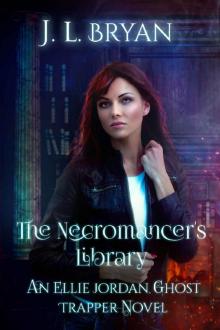 Ghost Trapper 12 The Necromancer's Library
Ghost Trapper 12 The Necromancer's Library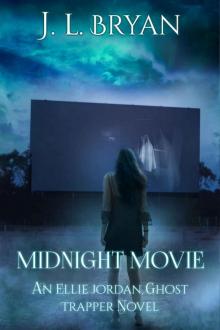 Ghost Trapper 14 Midnight Movie
Ghost Trapper 14 Midnight Movie_preview.jpg) Fairy Metal Thunder (Songs of Magic, Book 1)
Fairy Metal Thunder (Songs of Magic, Book 1)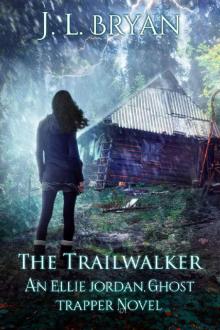 Ghost Trapper 13 The Trailwalker
Ghost Trapper 13 The Trailwalker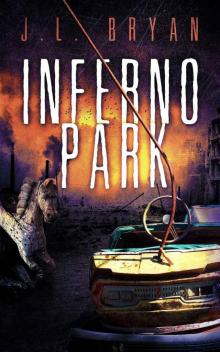 Inferno Park
Inferno Park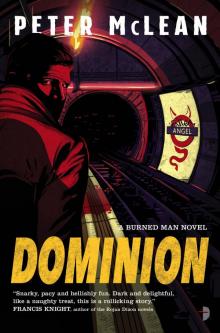 Dominion
Dominion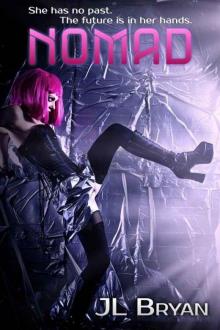 Nomad
Nomad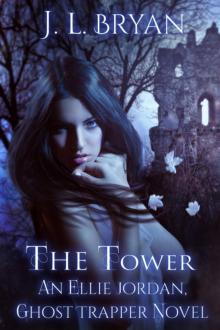 The Tower (Ellie Jordan, Ghost Trapper Book 9)
The Tower (Ellie Jordan, Ghost Trapper Book 9)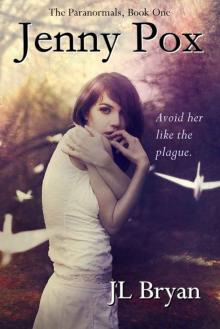 Jenny Pox (The Paranormals, Book 1)
Jenny Pox (The Paranormals, Book 1)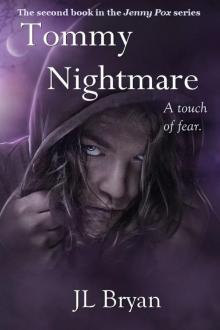 Tommy Nightmare (Jenny Pox #2)
Tommy Nightmare (Jenny Pox #2)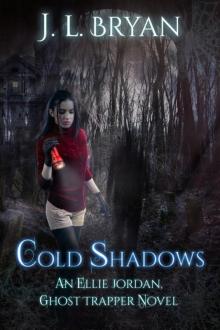 Cold Shadows (Ellie Jordan, Ghost Trapper Book 2)
Cold Shadows (Ellie Jordan, Ghost Trapper Book 2)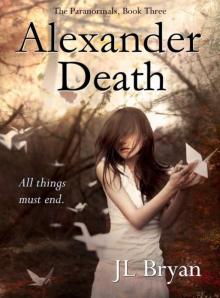 Alexander Death (The Paranormals, Book 3)
Alexander Death (The Paranormals, Book 3)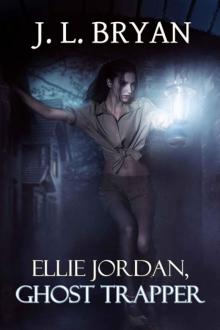 Ellie Jordan, Ghost Trapper
Ellie Jordan, Ghost Trapper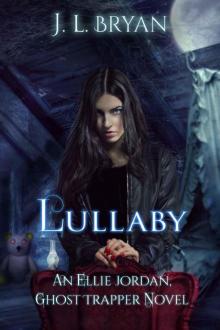 Lullaby (Ellie Jordan, Ghost Trapper Book 7)
Lullaby (Ellie Jordan, Ghost Trapper Book 7)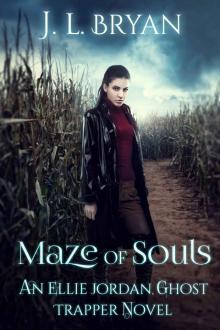 EJ06 - Maze of Souls
EJ06 - Maze of Souls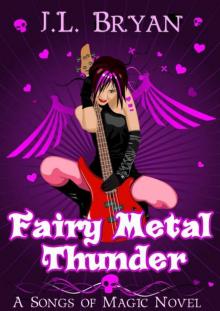 Fairy Metal Thunder (Songs of Magic, #1)
Fairy Metal Thunder (Songs of Magic, #1)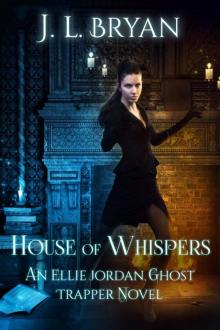 House of Whispers (Ellie Jordan, Ghost Trapper Book 5)
House of Whispers (Ellie Jordan, Ghost Trapper Book 5)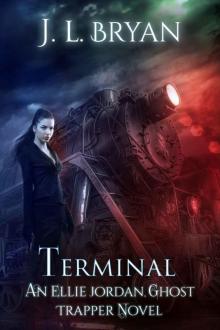 Terminal (Ellie Jordan, Ghost Trapper Book 4)
Terminal (Ellie Jordan, Ghost Trapper Book 4) Jenny Pox
Jenny Pox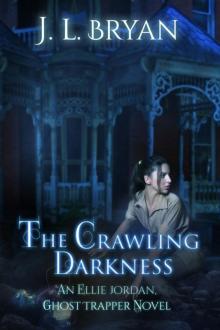 The Crawling Darkness (Ellie Jordan, Ghost Trapper Book 3)
The Crawling Darkness (Ellie Jordan, Ghost Trapper Book 3)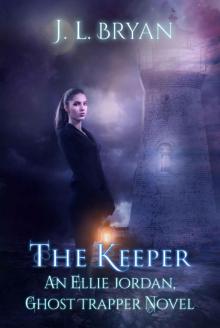 The Keeper (Ellie Jordan, Ghost Trapper Book 8)
The Keeper (Ellie Jordan, Ghost Trapper Book 8)